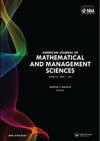Bayesian Inference of the Phase-Type Stress-Strength Reliability Models
Q3 Business, Management and Accounting
American Journal of Mathematical and Management Sciences
Pub Date : 2023-01-16
DOI:10.1080/01966324.2022.2162465
引用次数: 0
Abstract
Abstract Stress-strength modeling has achieved considerable attention in recent years due to its applicability in various areas like engineering, quality control, psychology, biology, genetics, medicine etc. Phase-type distribution is a generalized class of distributions that is closed under several mathematical operations like maxima, minima, convolution, finite mixture etc and any discrete or continuous probability distributions on the positive real line can be represented as phase-type. Hence stress-strength reliability models based on phase-type distributions give a generalized structure for the stress-strength models. Moreover, matrix representation of the parameters helps in their flexible evaluation and easy manipulation. In Bayesian inference, we combine the prior knowledge with the information provided by the set of current observations to make more reliable inferences. Bayesian approach has the advantage of providing more meaningful inferences by making use of all available information. In this paper, we assume that the strength of the system and the stress imposed on the system are phase-type random variables, and the Bayesian inference of stress-strength reliability is discussed for the single-component systems and multi-component systems. The computation of the Bayes estimate of stress-strength reliability using the Markov Chain Monte Carlo method, based on continuous and discrete phase-type distributions are explained.阶段型应力强度可靠性模型的贝叶斯推断
摘要近年来,应力强度建模由于其在工程、质量控制、心理学、生物学、遗传学、医学等各个领域的适用性而引起了人们的极大关注。相型分布是一类广义分布,在极大值、极小值、卷积、,有限混合等,并且正实线上的任何离散或连续概率分布都可以表示为相位类型。因此,基于相型分布的应力强度可靠性模型给出了应力强度模型的广义结构。此外,参数的矩阵表示有助于灵活评估和易于操作。在贝叶斯推断中,我们将先验知识与当前观测集提供的信息相结合,以做出更可靠的推断。贝叶斯方法的优点是通过利用所有可用信息提供更有意义的推断。在本文中,我们假设系统的强度和施加在系统上的应力是相位型随机变量,并讨论了单部件系统和多部件系统应力强度可靠性的贝叶斯推断。解释了基于连续和离散相型分布的马尔可夫链蒙特卡罗方法计算应力强度可靠性的贝叶斯估计。
本文章由计算机程序翻译,如有差异,请以英文原文为准。
求助全文
约1分钟内获得全文
求助全文
来源期刊

American Journal of Mathematical and Management Sciences
Business, Management and Accounting-Business, Management and Accounting (all)
CiteScore
2.70
自引率
0.00%
发文量
5
 求助内容:
求助内容: 应助结果提醒方式:
应助结果提醒方式:


